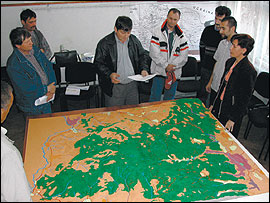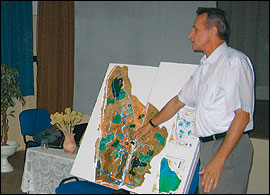 |
One Europe, More Nature: new perspectives for the Tisza River BasinA new WWF project harmonises local economic development with environmental improvements upstream and downstream in Hungary and Romania, and offers practical - natural - solutions to European challenges. |
 |
An integrated vision:
WWF's Edit Pop and
László Szántó discussing
the 3-D planning model
with community leaders
in Maramures, Romania. |
The forces driving land and water use patterns in Europe, such as international trade, economics, policies and climate change, are immense. Many of these forces hit especially hard in central and eastern Europe, with EU enlargement, floods, agricultural abandonment, and the everyday search for an economic basis at the forefront of the issues confronting rural communities everywhere. The prospect of trying to influence these processes is daunting, yet we are all part of these trends, and while they pose many threats, they also offer many opportunities.
WWF, through One Europe, More Nature, is identifying these opportunities and trying to make these dynamic forces work for nature and for people. By seeking out new partners and sectors, by understanding what business can do for nature and - importantly - what nature can do for business, economy and ecology can go hand-in-hand. Working in partnership with local communities, governments, and - crucially - businesses, new mechanisms for mainstreaming nature conservation into everyday life are being developed. Often the starting point is to realise that farmers in the future will not necessarily produce only food, but also (or even principally) other products and services like water management, landscape maintenance, habitat provision and tourism services.
New perspectives.
Starting in downstream Hungary at the first of the government's flood retention
reservoirs, WWF is piecing together an integrated plan for restoring Ecsedi
l? once one of central Europe's finest wetlands. By marrying a site-specific
management plan for the floodplain to the search for a big economic power
as investor, this twin-track approach offers hope for farmers facing multiple
problems as a result of the failure of industrialised monoculture agriculture
and the withdrawal of subsidies for mainstream farming.
All sorts of economic possibilities open up once stakeholders recognise
that change is not only needed but also advantageous. "We are investigating
alternative land management possibilities for our former floodplains including
biomass, and WWF is linking us to power stations in Hungary which have decided
to go green," explains Lajos Kovács, mayor of nearby Nagyecsed.
"The country will get its flood protection, the wetlands will be restored,
the power station will get its raw materials, and, importantly, we will
get jobs and a new economic pillar for our region."
 |
Farming of the future:
Károly Lőrincz of the
Szamos-Kraszna Water
Management Association
outlines possible future
land-use changes at a
meeting near Ecesdi l?
Hungary. |
New ideas.
Up in the headwaters of the Tisza in Romanian Maramures, WWF's office in
Baia Mare has embarked on an energetic community-participatory approach
to rural development. The aim is to protect and enhance the landscape and
ecological functioning of the Oas-Gutai plateau, one of the jewels of the
Carpathian Mountains. Working on forestry issues with the international
furniture giant IKEA, planning for improved grassland management through
high quality meat production, and seeking out business possibilities in
harmony with catchment management, WWF aims to improve the "sponge
function" of the plateau's headwaters. This protects the important
biodiversity of the region, so it can be a resource for the future as well
as present.
"This place is very special," says WWF local project officer Edit
Pop, "and it deserves a special approach. Our philosophy is that Maramures
can be branded as the green paradise of the Carpathians; not as a museum
piece but as a living, working, economically productive place to live. That
means we have to change the way we approach conservation and make it happen
through business, rather than as a brake to business." Already, governmental
organisations have bought into WWF's vision for the area and business leaders
now approach Edit with ideas on how to harmonise their needs with those
of nature.
WWF believes these positive stories have important lessons not just for
rural development and for nature conservation, but also for policy makers
at EU, national and local levels as well. "In linking the CAP and the
Water Framework Directive, and in managing our rivers and wetlands in a
more natural way, we are showing that flood management is possible which
optimises benefits to people and nature in very important locations,"
said Csaba Vaszk, WWF's project manager in Hungary. "That is a message
which is not just relevant to us here in Hungary, but to people struggling
with these issues all over the continent."